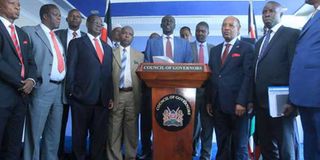Kenyans are more interested in devolution

Governors during a press conference in Nairobi on December 7, 2017. PHOTO | JEFF ANGOTE | NATION MEDIA GROUP
What you need to know:
- When innovative programmes are rolled out, beneficiaries will not care what party ticket the governor was elected on.
- Continuous delays in releasing funds to the counties is a tactic to frustrate governors and to keep control in Nairobi.
- Governors need to combine forces with legislators and seek an increased percentage of the national budget for devolved units
Good riddance to the horrible year of politics, uncertainty, division, fatigue and a shrinking economy. A New Year may not resolve many of the aforementioned problems but the Christmas season does give some respite, focus and inspiration to face the year with rejuvenated hope and revived energy.
Project Kenya still endures and stumbles on even if not at the speed that is needed or desired. The bar talk may be all about politics but at home the debate is on governors’ ability or failure to deliver the services that devolution promised.
As long as Mombasa remains filthy, smelly and a health hazard for its residents, Hassan Joho will get little audience when he speaks of secession.
On the other hand, when innovative programmes are rolled out, beneficiaries will not care what party ticket the governor was elected on.
This week, two of the most interesting, exciting and service-driven programmes were launched in the counties of Makueni and Machakos.
STREET ACTIVIST
Kivutha Kibwana transformed himself from a law professor to a street activist in the 1990s and led the campaign for a new Constitution in 1997.
Two decades later, he has become a practitioner and implementer of the 2010 Constitution in his home turf.
Makueni aims to be the first county to provide its 180,000 households with universal health care and the county team has spent the past few days registering residents for the nominal fee of Sh500.
Mindful that 60 per cent of people in his constituency live in poverty and cannot access affordable health care, Kibwana rolled out a pilot programme last year for the over 65s, giving them health coverage free of charge. He now has extended that programme to the whole population.
The free services provided in the county’s nine hospitals include drugs, emergency health services, theatre, laboratory, radiology, outpatient and inpatient services as well as physiotherapy, mental health and nutrition services.
HUGE STEP
Understandably, the county will provide some specialised services but cannot include things like CT scans, transplants, dialysis and MRI. But it is a huge step in implementing Article 43 of the Constitution, which states that every person has the right to the highest attainable standard of health, which includes the right to health care services, including reproductive health care.
This programme ambitiously addresses the twin problems of poverty and disease. In Machakos, Governor Alfred Mutua has chosen tertiary education as his priority programme for 2018. The county has committed itself to paying full tuition fees for every student admitted to accredited colleges for certificate courses right up to a first degree.
RAISE MORALE
If successfully implemented, this initiative will raise morale, education and living standards for Machakos residents.
Counties are now competing with each other in service provision. This is healthy and exciting but viewed with a degree of envy by the national government.
Continuous delays in releasing funds to the counties is a tactic to frustrate governors and to keep control in Nairobi. Governors need to combine forces with legislators and seek an increased percentage of the national budget for devolved units. Devolution is working. Better still, it will provide Kenyans with a new crop of national leaders in 2022 who don’t belong to dynasties or cartels but who have proven their worth at the local level.
[email protected] @GabrielDolan1




